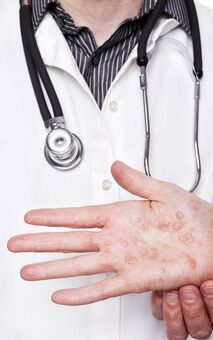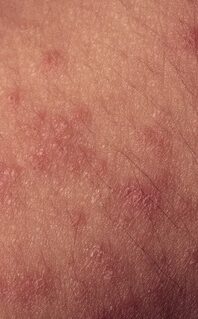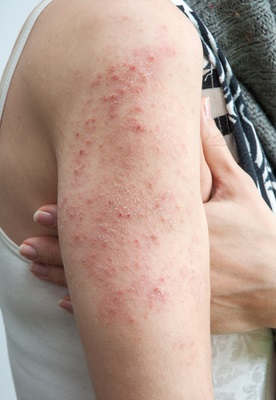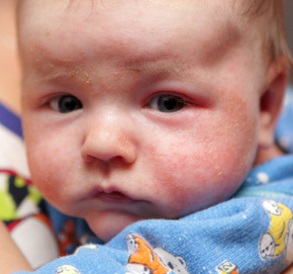
We’d like to show you some photos of eczema so you can see what eczema looks like. Of course, you should be cautious about diagnosing yourself based on the information you find on the internet. However, eczema is usually not a condition requiring immediate medical attention and in fact, it can often be managed without prescription drugs or other medical treatments. It’s also not contagious so you don’t have to worry about spreading it to others. Now, some other skin conditions are contagious or do require medical treatment, the sooner the better, so it’s important to know what you’re dealing with. We hope we can help you with that. If you have any questions about your condition, though, see your doctor.

What Eczema Looks Like
We’ll show you some photos of eczema to help you understand just what it looks like. Of course, the appearance of eczema can vary depending on many factors including where on the body it appears, the severity of the condition, and the skin tone of the person affected.
Mild cases of eczema may just look like patches of dry skin. The skin may be red or brownish in color and may appear thick, leathery, or scaly. In more severe cases, the skin may crack and bleed or ooze. In those cases, it usually looks painful (and it often is).

Eczema is usually very itchy and if you scratch a lot, you may break the skin, causing further bleeding and scabbing. The area may then become infected, in which case it may appear swollen and even redder than usual.
Eczema can occur anywhere on the body but it is most commonly found on the feet and ankles, hands and wrists, the crook of the elbows and the backs of the knees, the upper chest, neck, and face, according to the Mayo Clinic. When it occurs on the scalp, it may cause hair loss.
Eczema often begins in early childhood and when it appears in infants, it is most commonly found on the face and scalp. Oozing is more common with infantile eczema than with adult eczema, as well.
In mild cases, eczema may be barely noticeable. In severe cases, it can drastically affect your appearance. While it’s not contagious, people may not realize that and may worry about coming in close contact with someone that has the condition. People with severe eczema may feel very self-conscious about their appearance and may even withdraw from social situations for that reason.
Photos of Eczema

From these photos, you can see how eczema looks at different areas of the body. Keep in mind that the appearance of eczema can vary depending on the severity and your skin tone. If you’ve been scratching the area a lot, that can make it look different, too.
Again, we encourage you to see your doctor if you have any questions about your condition. If you have a skin condition that doesn’t quite look like what you see in these photos, it’s important to find out what you’re dealing with. Some skin conditions are contagious and some can be quite serious, so you may need medical attention.
How Do You Treat Skin Conditions That Look Like These Photos of Eczema?
Eczema can often be treated with over-the-counter remedies, including creams containing corticosteroids as well as natural remedies. In severe cases, prescription medications may be needed, such as oral or injected steroids, antibiotics, and immunomodulators. While prescription medications are often effective, they also carry the risk of some serious side effects.
If you’re interested in a natural treatment for eczema, one that is available without a prescription, we’d like to recommend Wild Naturals Eczema and Psoriasis Moisturizing Skin Cream. Notice in the above photos, how dry and rough and irritating eczema looks? This moisturizing skin cream soothes rough, irritated skin, locking in moisture, and relieving itching and discomfort. To learn more, just follow the link.
Mayo Clinic: Eczema Symptoms
